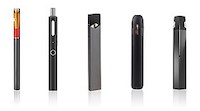
The studies were discussed in a lengthy report filed with NBC News. According to medical experts who have studied the subject, the list of reasons why vaping may make someone more vulnerable to coronavirus infection can vary. Among the possible causes are damage to lung tissues and changes to the way the body’s immune system responds to invaders. These changes can mean a stronger likelihood of infection every time the person is exposed to the virus, with smaller amounts of virus necessary to allow the infection to take hold. Additionally, social behaviors like vaping together or passing a vape among friends can also lead to higher likelihoods of infection.
The Stanford study surveyed 4,351 participants. They ranged in age from 13-24 years old and included participants from every US state as well as the District of Columbia and three US territories. Among those participants who had been tested for COVID-19 exposure, those who had vaped were five times more likely to have been diagnosed with the virus and those who had vaped along with smoking traditional cigarettes were 6.8 times more likely to have received a coronavirus diagnosis.
The report also notes that the CDC does not currently recognize vaping as a possible risk factor for COVID-19 infection; a fact that is surprising given the government’s relentless assault on the vaping industry prior to the onset of the coronavirus pandemic. From bans on flavored vape liquids to calls for the outright ban of the industry in general, legislators and lobbying groups alike were full steam ahead in their pursuit of vape producers and the stores that sold them before focus shifted to COVID-19.
In a related story, as millions of Americans lose their jobs and file unemployment claims while wondering what the future of work might look like in a post-pandemic world, Juul announced earlier this week that it was laying off half of its workforce as a result of market share lost to legislative pressure. “Throughout this year and against a difficult external environment…Our category has endured even tougher conditions and it has seemingly become even easier to sell combustible cigarettes than vapor products,” the company said in a post to its blog.
